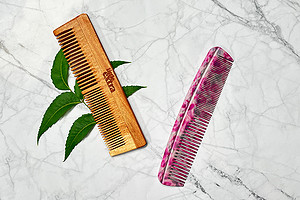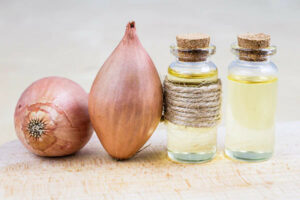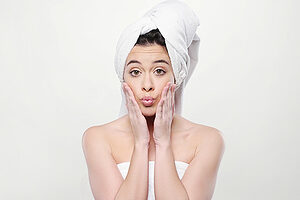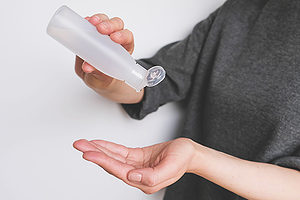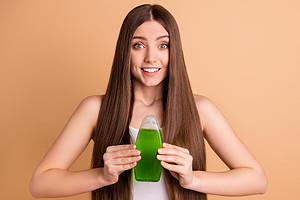Scalp health is the latest buzzword among those who want healthy and bouncy tresses as taking care of the skin that covers your head results in improved hair length and shine. (1)
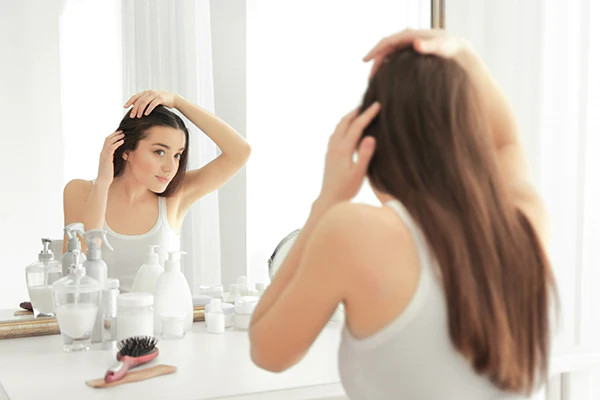
If you are experiencing dry, itchy, or flaky scalp, it could be due to underlying conditions that can be improved. For example, you need to pay extra attention to the skin where the hair grows out to achieve all your hair goals.
This article will examine the relationship between the scalp and hair and how they function together:
Article Contents
The Relationship Between Your Scalp and Hair
The scalp is made up of soft tissue layers covering the cranium. The face and neck border this area.
The scalp is the area where hair grows and serves as the body’s barrier to external irritation. It comprises five layers: the skin, connective tissues, the galea aponeurotica, dense areolar connective tissues, and, lastly, the pericranium. (2)
A 2019 study revealed that the scalp is a unique environment in the body that holds the hair follicles, specialized skin cells, and nerve endings together. It is an area with cutaneous and subcutaneous tissues, microbiomes, and continuous regeneration of hair follicles. (3)
The study concluded that any imbalance or change in the environment of the scalp results in dandruff, eczema, dermatitis, psoriasis, premature graying of hair, premature hair thinning, and hair fall. (3)
How to Boost Scalp Health
As scalp health plays a role in the onset of scalp- and hair-related conditions, it is imperative that it should be maintained. You can do so by following these measures:
1. Consume a proper diet

More people are taking dietary supplements for the hair, but consuming a balanced diet with the nutrients needed for a healthy scalp is equally, if not more, important. Such nutrients include vitamins A, B, C, and E, which can be found in leafy greens, sweet potatoes, berries, and nuts.
Hair is made of a protein called keratin and amino acids such as cysteine and glutamic acid. Examples of protein-rich foods are eggs, nuts, and beans, while amino acid-rich foods include nuts, avocados, and fish.
Eating these nutritious foods regularly can promote scalp health, leading to healthy hair growth. (4)
2. Use gentle hair care products
The pH of the scalp is 5.5 and that of the hair is 3.6–5.5, so you must use shampoos and conditioners that help maintain a healthy scalp pH (5) as well as remove dirt, excess sebum, and dead skin cells to keep the scalp skin on top condition.
Use herbal shampoos that contain natural ingredients so your scalp and hair are cleansed and nourished gently and effectively.
When browsing through the grocery aisle for shampoos, choose those that are sulfate- and paraben-free; doing so avoids scalp irritation that may stem from the harsh chemicals in regular shampoos.
If you have a dry scalp, do not wash your hair every day as it can strip away the natural oils protecting your tresses; instead, wash it three to four times a week only.
3. Scrub your scalp
Scrubbing your head stimulates the delivery of nutrients to your scalp and hair follicles. By exfoliating the scalp, you are also clearing it of dead skin cells, sebum, dirt, and product buildup.
Moreover, scrubbing helps the follicles grow more robust hair and removes flaking and fungal breakouts.
However, don’t overdo the scrubbing because rubbing the scalp too hard and too often can be counterproductive. Instead, do a scalp exfoliation only once or twice a week.
4. Try DIY scalp treatments
DIY or at-home scalp therapies include leave-on scalp masks and rinses that aim to clean, nourish, fight microbial growth, remove buildup, and promote blood circulation.
You can prepare a homemade scalp mask using onion juice, coconut oil, and yogurt to nourish your scalp and eliminate scalp fungi and bacteria as well as to stimulate hair growth.
You can also mix a few drops of tea tree oil with olive oil and use this mixture to eliminate excess oil and sebum from the scalp.
5. Wash your hair regularly
To improve your scalp’s health, it is vital to wash your hair and scalp twice a week. Avoid washing more often as it might lead to dryness and flakiness.
Also, wash your scalp with shampoos that do not have harsh ingredients such as parabens, sulfates, and fragrances, as these compounds are harsh on the scalp and may cause hair fall.
Homemade Scalp Masks and Oils to Boost Your Scalp Health
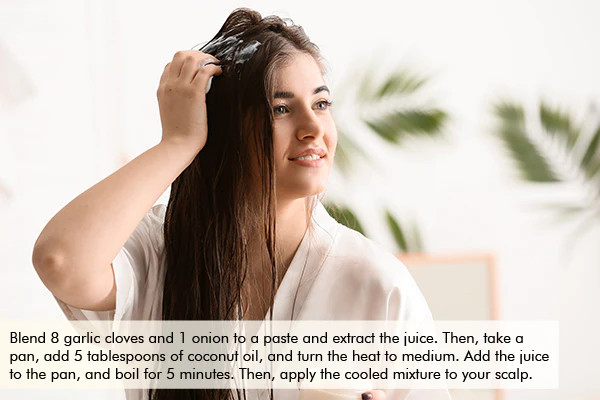
Try these at-home remedies to take of your scalp.
a. Garlic juice + onion juice + coconut oil
- Blend 8 garlic cloves and 1 onion to a paste and pass them through a sieve to extract the juice.
- Place a pan on the stove, add 5 tablespoons of coconut oil, and turn on the heat to medium.
- Add the extracted garlic-onion juice to the pan, and boil the mixture on low flame for 5 minutes.
- Remove the pan from the stove and keep it aside to cool down.
- Apply the cooled mixture to your scalp in circular motions for 10 minutes.
- Wash it off after 30 minutes with a good-quality shampoo and conditioner.
- Store this oil mixture for up to 5 days in a container in the fridge.
b. Onion juice + castor oil
- Mix 2 tablespoons of onion juice and 5 tablespoons of castor oil.
- Apply this mixture to your scalp and massage in circular motions for 5 minutes.
- Leave it on your scalp for 30–45 minutes before washing it off with a good-quality shampoo and conditioner.
c. Aloe vera gel + olive oil + tea tree essential oil
- Combine 1 tablespoon aloe vera gel and 4 tablespoons of olive oil and blend them well.
- Add a few drops of tea tree essential oil to it and mix well.
- Apply the mixture to your scalp and leave it on for 30 minutes.
- Wash it off with a good-quality shampoo and conditioner.
General Queries on How to Boost Your Scalp Health
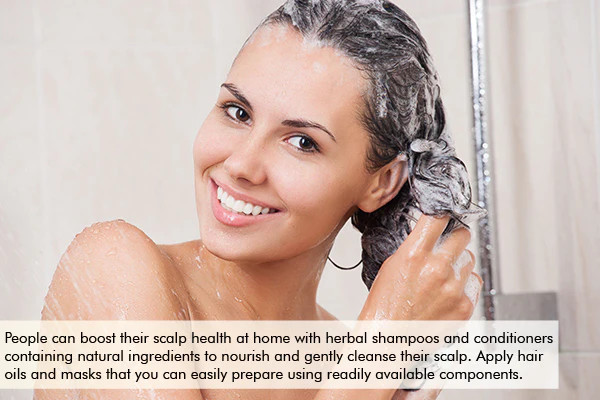
How can I boost my scalp health at home?
Use herbal shampoos and conditioners that contain natural ingredients so your scalp is nourished and cleansed gently.
Apply hair oils and hair masks that you can easily prepare using ingredients found readily at home such as onions, coconut oil, garlic, and curry leaves.
How often should I wash my scalp?
It is advisable to wash your scalp twice a week and to avoid washing more often as it might damage the cells on the hair, leading to oil secretion and more serious issues such as dandruff and other scalp-related problems.
How do I choose the best shampoo for my hair?
Opt for shampoos that suit your hair and scalp type. Before buying, take a look at the ingredients on the label and avoid buying products with parabens, sulfates, fragrances, etc.
Final Word
A healthy scalp leads to healthy hair; therefore, you must pay attention to it, especially if you experience itching, redness, bumps, flakiness, or hair loss.
Check with a dermatologist for any underlying medical reasons, and maintain your scalp health by using gentle cleansing ingredients, hair masks, and hair oils and by consuming a balanced diet rich in vitamins and minerals that support a healthy scalp.
References
- Trüeb RM, Henry JP, Davis MG, Schwartz JR. Scalp condition impacts hair growth and retention via oxidative stress. International journal of trichology. https://www.ncbi.nlm.nih.gov/pmc/articles/PMC6369642/. Published 2018.
- AA; TJG. Anatomy, head and neck, scalp. National Center for Biotechnology Information. https://pubmed.ncbi.nlm.nih.gov/31855392/.
- A; P-WKRLB-PUV. The role of the microbiome in scalp hair follicle biology and disease. Experimental dermatology. https://pubmed.ncbi.nlm.nih.gov/30974503/.
- Almohanna HM, Ahmed AA, Tsatalis JP, Tosti A. The role of vitamins and minerals in hair loss: A Review. Dermatology and therapy. https://www.ncbi.nlm.nih.gov/pmc/articles/PMC6380979/. Published March 2019.
- Gavazzoni Dias MFR, de Almeida AM, Cecato PMR, Adriano AR, Pichler J. The shampoo ph can affect the hair: Myth or reality? International journal of trichology. https://www.ncbi.nlm.nih.gov/pmc/articles/PMC4158629/. Published July 2014.


